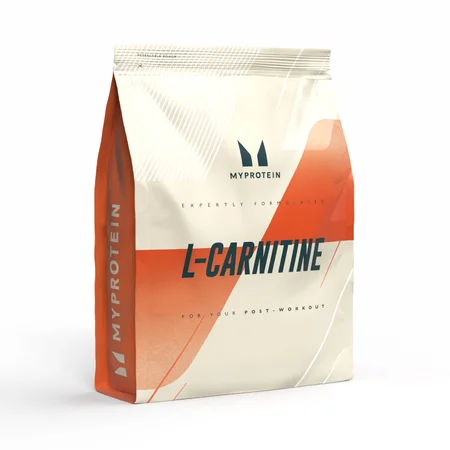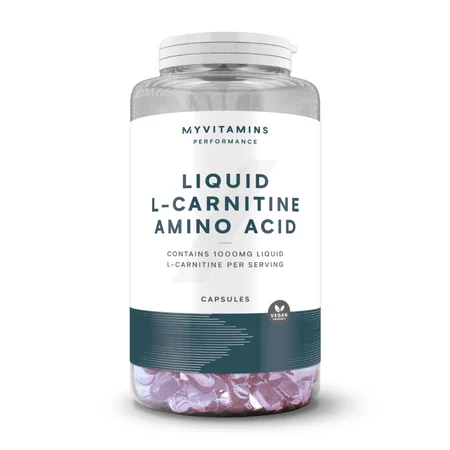What Is L-Carnitine? | L-Carnitine Benefits, Dosage & When To take?


L-carnitine is another supplement that sounds confusing, so we’re here to break apart the fact from the fiction. So, what exactly is this interesting supplement?
It’s been used by athletes all around the world for its fat-burning capabilities, since it could potentially optimise how your body uses fat as a fuel source, leading to greater exercise performance.3 Many people use L-carnitine for weight loss and fat burning purposes, and when taken correctly, could be a great addition to your training regime. Let’s find out more.
- What is L-carnitine?
- Benefits of L-carnitine
- How does L-carnitine work?
- Types of L-carnitine & it’s uses
- Dosage
- L-carnitine food sources
- L-Carnitine Side Effects
- FAQs
What is L-carnitine?
It’s a non-essential amino-acid-like compound, meaning it’s produced in the body naturally.
You can get a certain amount of L-carnitine from your diet, as it’s found in foods such as red meat — typically the redder the meat, the better. Plant sources such as avocado and soybean contain small amounts too.
Supplements should be consumed alongside a healthy diet, but are often recommended to anyone who struggles to get enough of a certain nutrient in their diet.5
What does L-carnitine do?
L-carnitine is responsible for transporting long-chain fatty acids to your cells’ mitochondria, where energy is then produced as the fat is oxidised and used for fuel. More than 95% of the body’s L-carnitine stores are found in skeletal muscle (muscle which is connected to your skeleton), along with trace amounts in the liver and blood.6
Benefits of L-carnitine
1. L-carnitine may aid weight loss
It’s been theorised that L-carnitine could help your body to produce energy by utilising the body’s fat stores, allowing you to work out for longer and ultimately aiding in fat loss. Evidence suggests it may promote weight loss by increasing calorie expenditure.6
Taking an L-Carnitine supplement daily has been proven to increase the blood and muscular concentrations of this amino acid-like compound, which could enhance fat metabolism as a result with increased muscle carnitine concentrations.6
2. L-Carnitine may improve exercise performance & recovery
Given its potential fat-burning capabilities, it’s thought that L-carnitine optimises how your body uses fat for fuel, allowing you to exercise for longer. Some research has also found that three weeks’ supplementation with an L-carnitine supplement reduces muscle damage from high intensity exercise bouts.7
Supplementing with L-carnitine could also play an important role in recovery from strenuous exercise, with suggested doses of 2-4g daily to optimise results.6 There’s initial evidence that this could lead to a reduction in various markers of metabolic stress and muscle soreness which is replicated in many studies. However, research is still limited and further studies are needed.2
3. L-carnitine may support heart health
Research supports medically supervised use of L-carnitine for treating cardiac related issues and is often given by IV by a medical professional. It may boost energy levels as it increases the amount of fuel availability that the heart requires to function. In a systematic review by the Mayo Clinic, carnitine was associated with a 27% reduction in all-cause mortality.3
L-carnitine may also play a role in keeping cholesterol levels in a healthy range.4

How does L-carnitine work?
When you exercise, thousands of biochemical reactions are taking place inside your body. One of these is the action of your enzymes starting to break down stored fat into fatty acids and glycerol, a sugar alcohol. These are then used as fuel throughout exercise.
Studies have theorised that L-carnitine is a compound that plays an important role in this process of fat metabolism as its key role is to transport the long-chain fatty acids across the inner membrane. These fatty acids are thought to be the main energy sources used during low- to moderate intensity exercise.2
Types of L-carnitine and their uses
The two main variations of L-carnitine that are supplemented in the diet are L-carnitine tartrate and acetyl L-carnitine.
1. L-carnitine Tartrate
L-carnitine tartrate is one of the most common forms of L-carnitine found in sports nutrition supplements due to its rapid absorption rate.9 It’s created in the body from the amino acids lysine and methionine and is mainly synthesised in the liver and kidneys before being transported for use in other tissues in the body.
L-carnitine tartrate is found in its highest levels in tissues that use fatty acids as the main fuel source, such as the skeletal and cardiac muscles. It should be taken in conjunction with a healthy, balanced diet and exercise regime.3
2. Acetyl L-carnitine (ALCAR)
Acetyl L-carnitine is created in the body from the amino acids’ lysine and methionine. ALCAR has an acetyl group attached to the carnitine molecule. This allows it to pass through the blood-brain barrier making it the most bio-available, and thus most easily absorbed, form.
ALCAR is ideal for athletes and active people who take part in regular exercise or anyone looking for an easy-to-consume source of L-carnitine that can be taken throughout the day.4
Dosage – How much L-carnitine should you take?
Studies suggest varying doses for each form of L-carnitine for best results, the following is deemed optimal for each form of carnitine5:
Acetyl-L-Carnitine: 600–2,500 mg per day.
L-Carnitine L-Tartrate: 1,000–4,000 mg per day.
Propionyl-L-Carnitine: 1,000–4,000 mg per day.
When should you take L-carnitine?
If your plan is to use this supplement to optimise energy during your workout, it’s best to take it prior to working out. Most scientific studies recommend taking L-carnitine about one hour prior to exercise. However, if you want to take advantage of the other benefits (recovery and weight loss support), taking it after exercise can also be effective.
Which foods contain L-carnitine
Although this supplement can be made by the body, you can also up your L-Carnitine intake from your diet. It’s highest in animal products like beef, lamb, pork, poultry, fish, and dairy products.
Whey (made from milk) naturally contains some L-carnitine, and plant-based sources contain it in small amounts, like nuts, seeds, whole grains and some fruits and vegetables (like avocados and asparagus).
L-carnitine side effects
Side effects of this supplement are mild because it’s naturally found in our food. Following dosage recommendations did not show serious adverse side effects when taken for less than 12 months, but included stomach upset, breath and urine odour, and seizures in some cases.
Consult a GP if you’re considering L-carnitine.5
Take home message
It’s been suggested that L-carnitine has the ability to move more fatty acids into your cells to be burnt for energy, making it an effective performance enhancer, and it may also be beneficial for fat burning and weight loss.
While there are some positive results with L-carnitine supplementation, it must be considered that the overall scientific evidence is lacking.
The various forms of L-carnitine are perfect supplements for people who don’t easily acquire it from natural food sources as a part of their normal diet.
FAQs
It is recommended to take this supplement with fast acting carbohydrates. Whether it is taken pre or post workout isn’t considered an important factor.
This supplement is a non-essential amino-acid-like compound, responsible for transporting long-chain fatty acids to your cell’s mitochondria, where energy is produced from the fat’s oxidisation.
Evidence suggests that this supplement may promote fat loss and optimise exercise performance and recovery.
This supplement transports fatty acids across the inner membrane. These fatty acids are thought to be the main energy source during low to medium intensity exercise.
L-Carnitine Tartrate is a common form found in sports supplements due to its high absorption rate. Acetyl L-Carnitine is the most easily absorbed form, making it ideal for athletes and active people.
READ THESE NEXT:

Claire is a Registered Dietitian through the Academy of Nutrition and Dietetics and a board-certified Health and Wellness Coach through the International Consortium for Health and Wellness Coaching. She has a Bachelor of Science in Biology and a Master’s degree in Clinical Dietetics and Nutrition from the University of Pittsburgh.
Talking and writing about food and fitness is at the heart of Claire’s ethos as she loves to use her experience to help others meet their health and wellness goals.
Claire is also a certified indoor cycling instructor and loves the mental and physical boost she gets from regular runs and yoga classes. When she’s not keeping fit herself, she’s cheering on her hometown’s sports teams in Pittsburgh, or cooking for her family in the kitchen.
Find out more about Claire’s experience here.






